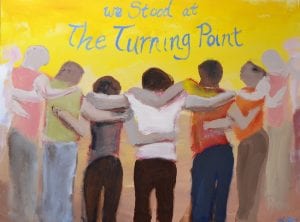Addiction can turn a person we love into someone unrecognizable. Addicts say and do things that are hurtful to family members, affecting the entire dynamic of the family unit. In addition to the emotional pain and erosion of trust caused by addiction, financial or legal problems may also result. However, recovery is possible for the addicted person and the family, and with support, the odds of recovery increase.
Just as addiction affects the entire family, successful recovery is a whole family process. Family support ranges from providing encouragement to a willingness to adapt the household to a safe environment for the recovering addict. This means creating a healthy environment that is both free of addictive substances and one that is as stress-free as possible. Addiction is a chronic disease, so recovery becomes a life-long process. Ongoing family support plays a crucial role in long-term recovery.
A study published by the National Institute on Drug Abuse noted that “findings suggest that family support in the intervention process, enhanced by psycho-education, contributes to a higher rate of recovery success among addicts.” It is often action taken by the family that gets the recovery process started.
Why Family Support is Critical in Recovery
Recovery from addiction is the most important step for an addict, as ongoing addiction can lead to mental and physical deterioration and even death. There are many vital factors for a successful recovery. Family support is one of the most critical.
- Your Recovery May Depend on Family and Friends
The National Institute on Drug Abuse (NIDA) has found a positive correlation between family support and a lowered risk of relapse. Family involvement throughout each step of recovery is crucial for the patient to feel supported, loved, cared for and safe.
- Open and Supportive Communication Is Key
It is not uncommon for someone suffering with addiction to feel shame in communicating their experiences. Having open and supportive communication with family and friends can ease the fear of judgment during and after recovery.
- Your Family Heals with You
When a person suffers from addiction, their family does, too. As a result, family members must learn new tools to adapt to the new recovery lifestyle. Many families struggle with co-dependence which enables addiction, therefore, everyone will need to learn healthy behaviors to encourage healthy growth. Family should evaluate their own triggers and work with the person in recovery to develop a new, healthy strategy that encourages the recovery of both the patient and family members.
A family intervention can guide a loved one to a recovery program
It can be difficult for addicts to recognize when they have reached the point where their substance abuse has become a serious problem. They may refuse or be in denial about how severely their drug or alcohol use has impacted those around them. They may scoff at the idea that they need help. An intervention may be the catalyst for acceptance of the problem while providing a plan for action.
Family or friends of the addict may initiate the intervention process. The process is often facilitated by a clergy member, an addiction specialist, such as an alcohol or drug counselor, or by a professional interventionist. A certified interventionist has extensive training as an addiction and intervention specialist.
What does an intervention plan entail?
- Pinpoint a time when loved one will be sober
- Decide who should participate in the intervention
- Write out and discuss what each person will say and what to do if a loved one refuses treatment
- Have a clearly defined treatment plan in place
What you should do during an intervention:
- Calmly give specific examples of how your loved one’s addictive behavior has impacted family
members, friends, and others - Request that he or she agrees to treatment
- Describe the steps and goals of the treatment plan
- Reassure that family believes recovery is possible, and they will support throughout
- Family counseling throughout the process is recommended
How family can help throughout the recovery journey
 Addiction affects millions of Americans each year. Throughout the course of their addiction, it is typical for the addict to begin to remove themselves from friends and family. Unfortunately, this is the worst possible situation for a person suffering from substance abuse. It is vital to the success of the recovery process for an addict’s family to be supportive and involved in their lives.
Addiction affects millions of Americans each year. Throughout the course of their addiction, it is typical for the addict to begin to remove themselves from friends and family. Unfortunately, this is the worst possible situation for a person suffering from substance abuse. It is vital to the success of the recovery process for an addict’s family to be supportive and involved in their lives.
NAADC, an association of addiction professionals, states, “Recovery is supported through relationship and social networks. An important factor in the recovery process is the presence and involvement of people who believe in the person’s ability to recover; who offer hope, support and encouragement; and who also suggest strategies and resources for change.”
There are many ways family members can offer help to their loved one in recovery. From practical assistance with medication management, the willingness to explore new family activities to diligent maintenance of a healthy home, family is an invaluable asset to a person in recovery.
Here are several ways families can support their loved one suffering from addiction:
Stop Enabling
- Are you confused as to what is considered “enabling” versus “helping”? The easiest way to differentiate between the two is: If you are aiding an addict with something they should be able to do themselves, you are probably enabling their behavior, sometimes without even realizing you are making the problem worse.
- Have you ever lied on behalf of the person suffering from the addiction, or provided money to them? Is the person making you feel guilty for not “helping them?” These are clear signs of enabling. Enabling, unfortunately, causes the struggling person, to continue to use longer and get deeper into their denial about their behaviors and use.
Understand Family Suffers, Too
- What many people do not understand is the family of the addicted person suffers from the addiction, too. This is why it is imperative for families to receive educational tools to help them support their addicted family member. This is challenging because addicts tend to feel guilt and shame, therefore withdrawing from the family and heading further down a destructive path.
- A reputable treatment program will include family members in the individual’s recovery process. Family members can also attend their own 12 step support groups as well as individual therapy for themselves. This establishes clear boundaries and programs for each family member and their loved one in treatment. This process creates a sense of trust moving forward.
Some other ways family can offer support include:
- Participate in family counseling and support groups like Al-Anon or Nar-Anon and encourage children to attend Alateen or Narateen
- Become educated about addiction
- Help keep loved one on track with medications and doctor visits
- Meet with a treatment team to be informed of progress, concerns or other issues
- Remain committed to a drug and alcohol-free home environment
- Help loved one stay away from people, places or situations that have triggered past addictive behavior
- Encourage loved one to commit long-term to regular counseling, and/or attendance at a 12-step program or other support program
- Be open to developing new social connections with those who abstain from alcohol and drugs
- Explore drug and alcohol-free activities you and your loved ones can do together
How Al-Anon, Nar-Anon, Alateen, or Narateen can help?
Programs like Al-Anon, for families and friends of alcoholics, and Nar-Anon, for families and friends of drug addicts, are free support groups. Alateen and Narateen are specifically designed to help young family members understand and cope with addiction of a family member. These groups provide valuable education, support, and encouragement to those impacted by a loved one’s addiction. The more families and friends understand about addiction, the more they understand why recovery is a lifelong process, and how important their role is in the process.
These support groups not only help families and friends to understand more about the disease of addiction but also offer valuable emotional support to the group participants. Members of these groups have all been negatively affected by addiction and have unique empathy and ability to relate to and support one another.
The support and education offered by groups like Al-Anon, Nar-Anon, Alateen, Narateen and others may also help families identify cycles of enabling and codependency that may have been a part of the family dynamic, and ways to break those cycles.
Ways a support network can help those in recovery
A support network does not solely consist of family members. It can also include friends, clergy, support group members, sponsors, counselors, health care professionals, and others. Each member of a support network plays an important role in recovery success.
Members may:
- Maintain their own recovery and healthy lifestyle, through meetings, family groups, counseling or spiritual path
- Support with positive energy, including optimism, patience, and encouragement
- Introduce to new hobbies and activities or reintroduce to previously enjoyed activities
- Encourage healthy habits and lifestyle, such as exercise, nutrition, meditation, yoga, and journaling
- Be available any time, whether just to listen or to respond to a call of trouble
Turning Point of Tampa supports families through the recovery process
 Seeking professional assistance is vital to recovery. A Residential Treatment Program, followed by a step down to an Intensive Outpatient Program, can help your loved one’s recovery by providing the necessary coping skills, a safe place, and education as they continue their sobriety journey.
Seeking professional assistance is vital to recovery. A Residential Treatment Program, followed by a step down to an Intensive Outpatient Program, can help your loved one’s recovery by providing the necessary coping skills, a safe place, and education as they continue their sobriety journey.
At Turning Point of Tampa, we have seen how vital family support is to recovery. We are committed to providing resources to family members to give them the tools they need to help their loved one, other family members, and themselves to heal. Our weekly family support group is free of charge to any family member of a current or former client. This ongoing support is available to assist in the family member’s personal recovery journey.
Family issues are also addressed during our Intensive Outpatient Program. Clients can invite family members to attend one of their three nights of treatment, to participate in the education/process therapy group. This eight-week program covers such topics as Relapse Prevention, Family Dynamics, Dual Diagnosis, and Codependency. Turning Point of Tampa has found that including the family in the therapeutic process strengthens our clients’ recovery.
Turning Point of Tampa’s goal is to always provide a safe environment and a solid foundation in 12-Step recovery, in tandem with quality individual therapy and groups. We have been offering Licensed Residential Treatment for Substance Abuse, Eating Disorders and Dual Diagnosis in Tampa since 1987.



